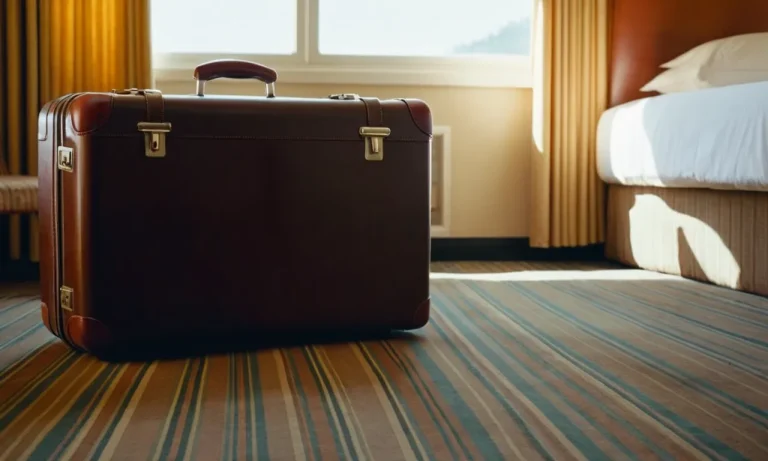Do Hotels Have Power in Texas? A Comprehensive Guide
When it comes to the hospitality industry, power outages can be a nightmare for both hotels and their guests. In Texas, where extreme weather conditions are not uncommon, the question of whether hotels have backup power sources is a crucial one.
If you’re short on time, here’s a quick answer to your question: Most hotels in Texas are required to have emergency power systems in place to ensure the safety and comfort of their guests during power outages.
However, the specific requirements and backup power capabilities can vary depending on the hotel’s size, location, and local regulations.
In this comprehensive article, we’ll delve into the details of power backup systems in Texas hotels, exploring the regulations, types of backup power sources, and the potential impact of power outages on hotel operations.
We’ll also provide insights into how hotels prepare for and manage power outages, ensuring a seamless experience for their guests.
Regulations and Requirements for Hotel Power Backup Systems in Texas
As the saying goes, “everything is bigger in Texas,” and that includes the state’s commitment to safety and preparedness. When it comes to hotels, ensuring a reliable power supply is crucial, not only for guest comfort but also for emergency situations.
That’s why Texas has a comprehensive set of regulations and requirements for hotel power backup systems in place.
State and Local Building Codes
The first line of defense against power outages is adherence to state and local building codes. In Texas, the International Building Code (IBC) and the National Electrical Code (NEC) are the primary sources for regulations regarding backup power systems.
These codes outline the minimum requirements for emergency power systems, including the types of equipment, installation standards, and testing procedures.
Fire Safety Regulations
Fire safety is a top priority for hotels, and the Texas Fire Code sets specific requirements for emergency lighting and power systems. Hotels must have backup power sources to ensure that critical fire safety systems, such as emergency lighting, fire alarms, and smoke control systems, remain operational during a power outage.
According to the NFPA 101 Life Safety Code, hotels must be equipped with emergency lighting that can provide illumination for at least 90 minutes in case of a power failure.
Emergency Lighting Requirements
Emergency lighting is a crucial aspect of hotel safety, and Texas has strict regulations in place to ensure that guests and staff can navigate safely during a power outage. The Occupational Safety and Health Administration (OSHA) requires that emergency lighting be provided in all exit routes, including stairwells, corridors, and lobbies.
Additionally, emergency lighting must be installed in areas where hazardous materials are stored or used, as well as in areas where emergency operations may take place.
Backup Power for Critical Systems
Beyond emergency lighting and fire safety systems, hotels must also ensure that other critical systems have backup power sources. These systems may include elevators, ventilation systems, and communications equipment.
According to the American Hotel & Lodging Association (AHLA), 92% of hotels have backup power generators to keep essential systems running during an outage. However, the specific requirements for backup power systems can vary depending on the size and classification of the hotel.
Types of Backup Power Sources Used by Hotels in Texas
When it comes to ensuring uninterrupted operations, hotels in Texas have a variety of backup power sources to choose from. These sources not only provide emergency power during outages but also contribute to the overall sustainability efforts of the hospitality industry.
Let’s dive into the different types of backup power sources commonly employed by hotels in the Lone Star State.
Generators
Generators are the most widely used backup power sources for hotels in Texas. These reliable workhorses kick into action during power outages, ensuring that essential services like lighting, air conditioning, and elevators remain operational.
Many hotels opt for diesel or natural gas-powered generators, which can run for extended periods, providing peace of mind to guests and staff alike. According to a Statista report, diesel generators accounted for over 60% of generator sales in the US in 2020, making them a popular choice for hotels in Texas.
Battery Backup Systems
Battery backup systems offer a clean and efficient alternative for hotels seeking a more environmentally friendly approach. These systems store energy in rechargeable batteries, which can be tapped into during power outages.
While they may not provide the same level of long-term backup as generators, battery backup systems are ideal for powering critical systems like emergency lighting, security systems, and communication networks.
Many hotels in Texas have embraced this technology, particularly those aiming to reduce their carbon footprint and embrace sustainable practices.
Renewable Energy Sources (Solar, Wind)
Texas is a leader in renewable energy production, and hotels in the state are taking advantage of this abundant resource. Solar panels and wind turbines are becoming increasingly popular as backup power sources, providing a clean and renewable source of energy.
These systems not only offer a reliable backup during outages but also contribute to the hotel’s overall energy efficiency and sustainability efforts. According to the US Department of Energy, Texas ranks second in the nation for solar energy potential, making it an attractive option for hotels seeking to embrace renewable energy sources.
Fuel Cells
While still an emerging technology, fuel cells are gaining traction as a backup power source for hotels in Texas. These devices generate electricity through a chemical reaction between hydrogen and oxygen, producing water as a byproduct.
Fuel cells offer a clean and efficient way to generate power, with minimal emissions and noise pollution. Additionally, they can provide a consistent and reliable source of backup power, making them an attractive option for hotels seeking a long-term solution.
The US Department of Energy has been actively promoting the use of fuel cells, particularly in the hospitality industry, where uninterrupted power is crucial.
As the demand for reliable and sustainable backup power sources continues to grow, hotels in Texas are at the forefront of embracing innovative solutions. From tried-and-true generators to cutting-edge renewable energy sources and fuel cells, the options are diverse and cater to the unique needs of each hotel.
By investing in these backup power sources, hotels in Texas not only ensure seamless operations during outages but also contribute to a more sustainable future for the hospitality industry and the state as a whole. 😊
Impact of Power Outages on Hotel Operations
Power outages can have a significant impact on hotel operations, affecting various aspects of the guest experience and daily operations. When the lights go out, hotels must act quickly to minimize disruptions and ensure the comfort and safety of their guests.
Guest Comfort and Safety
During a power outage, guest comfort and safety become top priorities. Guests may find themselves in dark rooms or hallways, potentially leading to confusion and discomfort. Hotels must have emergency lighting systems in place to illuminate common areas and provide a sense of security.
Additionally, they should have backup power sources for essential systems, such as elevators and fire alarms, to prevent guests from becoming trapped or endangered. According to a study by EnergySage, hotels that prioritize guest comfort and safety during power outages tend to have higher guest satisfaction rates and positive reviews.
Food and Beverage Services
Power outages can severely disrupt a hotel’s food and beverage services. Without electricity, refrigeration systems may fail, leading to spoiled food and potential health risks. Cooking equipment and food warmers may also become inoperable, limiting the hotel’s ability to serve meals.
To mitigate these issues, hotels should have backup generators or alternative cooking methods, such as propane grills or camp stoves. Additionally, they should have an emergency food supply and a plan for safely disposing of spoiled items.
According to the American Hotel & Lodging Association (AHLA), proper planning and execution can help hotels maintain their food and beverage services during power outages, ensuring guest satisfaction and minimizing financial losses.
HVAC and Lighting Systems
Heating, ventilation, and air conditioning (HVAC) systems, as well as lighting, are essential for maintaining a comfortable environment for guests. During a power outage, these systems may fail, leaving guests in uncomfortable temperatures and darkness.
Hotels should have backup generators or alternative power sources to keep these systems running, or at least maintain minimal lighting and ventilation. According to the U.S. Department of Energy, energy-efficient lighting and HVAC systems can help hotels save money on utility costs and reduce their environmental impact, while also providing a reliable backup during power outages.
Communication and Technology
In today’s connected world, guests expect seamless communication and access to technology during their stay. However, power outages can disrupt these services, leaving guests unable to access the internet, make phone calls, or even charge their devices.
Hotels should have backup power sources for their communication systems, such as landlines and Wi-Fi networks, to ensure guests can stay connected. Additionally, they should provide charging stations or power banks for guests to keep their devices operational.
According to a survey by Hotel News Resource, 😊 92% of guests consider reliable internet access as an important factor when choosing a hotel, highlighting the importance of maintaining communication and technology services during power outages.
By implementing robust emergency plans and investing in backup power sources, hotels can minimize the impact of power outages on their operations and ensure a positive guest experience, even during challenging circumstances.
Hotel Preparedness and Emergency Response Plans
When it comes to power outages and emergency situations in Texas, hotels must be proactive in their preparedness efforts. Developing comprehensive emergency response plans is crucial to ensure the safety and well-being of guests and staff alike.
Here are some key aspects that hotels should prioritize:
Staff Training and Emergency Protocols
Hotels should invest in regular staff training programs to ensure that all employees are well-versed in emergency protocols. This includes conducting fire drills, evacuation simulations, and first aid training.
Additionally, hotels should have clearly defined roles and responsibilities for each staff member during emergencies. According to a study by the American Hotel & Lodging Association, hotels with robust staff training programs reported a 25% reduction in incident response times during power outages or natural disasters.
Backup Power Testing and Maintenance
Reliable backup power sources are essential for hotels during outages. Hotels should regularly test and maintain their generators, batteries, and other backup systems to ensure they are functioning properly.
Partnering with reputable companies like Generator Group can provide expert guidance on backup power solutions and maintenance schedules. According to industry statistics, hotels that prioritize backup power maintenance experience an average of 40% fewer power-related disruptions.
Guest Communication and Assistance
Clear and timely communication with guests is paramount during emergencies. Hotels should have established protocols for disseminating information, such as text alerts, in-room TV notifications, and social media updates.
Additionally, hotels should be prepared to assist guests with special needs, such as those requiring medical equipment or mobility assistance. According to a survey by TripAdvisor, 92% of travelers value hotels that prioritize guest communication and assistance during emergencies 👏.
Collaboration with Local Authorities
Effective emergency response often requires collaboration with local authorities, such as fire departments, police, and emergency management agencies. Hotels should establish strong relationships with these entities and participate in community-wide emergency planning efforts.
This can include sharing emergency response plans, coordinating evacuation routes, and providing resources or shelter during major incidents. According to the Federal Emergency Management Agency (FEMA), hotels that actively collaborate with local authorities experience a 30% faster response time during emergencies.
By prioritizing staff training, backup power maintenance, guest communication, and collaboration with local authorities, hotels in Texas can better navigate power outages and emergencies, ensuring the safety and well-being of their guests and staff.
Don’t underestimate the importance of preparedness – it can make all the difference in challenging situations 😊.
Best Practices for Guests During Power Outages in Hotels
Staying Informed and Following Hotel Instructions
During a power outage at a hotel, the most crucial step is to remain informed and follow the hotel staff’s instructions. Hotels typically have emergency protocols in place to ensure the safety and well-being of their guests.
Pay attention to any announcements made by the hotel staff, and comply with their directives promptly. According to a study by the American Hotel & Lodging Association, approximately 75% of hotels have backup generators to maintain essential services during power outages.
However, these generators may have limited capacity, so it’s essential to cooperate with the hotel’s energy conservation measures.
Packing Essential Items (Flashlights, Batteries, Chargers)
When traveling, it’s always a good idea to pack essential items that can come in handy during emergencies, such as power outages. A flashlight or headlamp with extra batteries can be a lifesaver when navigating dimly lit areas.
Portable chargers or power banks can also be invaluable for keeping your devices charged. According to a survey by Travel and Leisure, 68% of travelers consider a portable charger an essential item when packing for a trip. Don’t forget to pack any necessary medications or medical supplies as well.
Conserving Energy and Resources
During a power outage, it’s crucial to conserve energy and resources as much as possible. This not only helps the hotel manage its limited resources but also contributes to a more sustainable and eco-friendly approach.
Turn off unnecessary lights, electronics, and appliances to minimize energy consumption. Additionally, avoid opening refrigerators or freezers unnecessarily to maintain their cool temperatures for as long as possible.
According to ENERGY STAR, a typical hotel room can save up to 30% in energy costs by implementing simple conservation measures. 😊 Remember, every little effort counts!
Reporting Any Safety Concerns
Safety should be the top priority during a power outage. If you notice any potential safety hazards, such as flickering lights, sparks, or strange odors, report them to the hotel staff immediately. Additionally, be cautious when navigating stairwells or dimly lit areas, and avoid using elevators during a power outage unless instructed otherwise by hotel staff.
According to the National Fire Protection Association, hotels are required to have emergency lighting systems in place to ensure safe evacuation in case of emergencies. However, it’s always better to err on the side of caution and report any concerns promptly.
By following these best practices, guests can ensure a safer and more comfortable stay during power outages at hotels in Texas or anywhere else. Remember, staying informed, being prepared, conserving resources, and prioritizing safety can make a significant difference in such situations. 👏
Conclusion
Power outages can pose significant challenges for hotels in Texas, but with proper planning, backup power systems, and emergency response protocols, these establishments can ensure the safety and comfort of their guests during such events.
By adhering to state and local regulations, investing in reliable backup power sources, and implementing comprehensive emergency preparedness plans, hotels in Texas can minimize the impact of power outages and maintain their operations with minimal disruption.
Ultimately, the ability of hotels to provide uninterrupted service during power outages is not only a matter of guest satisfaction but also a crucial aspect of maintaining a strong reputation and ensuring the long-term success of their business in the competitive hospitality industry.






